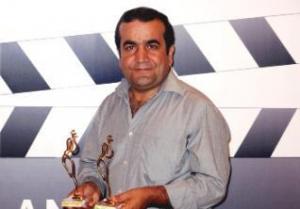
Iraqi, Tunisian films take top prizes at Beirut film festival

The 2010 edition of the Beirut International Film Festival wound down with a gala award ceremony at Qasr Unesco Wednesday evening. A smattering of prizes were doled out, with top honors going to films from Iraqi Kurdistan and Tunis.
The BIFF jury awarded Iraqi-Kurdish director Shawkat Amin Korki the prize for Best Middle Eastern Feature Film for his recent feature film “Kick Off.” An Iraq-Japan co-production, “Kick Off” had its world premier in the competition of the Dubai International Film Festival in 2009. It later competed in the Gulf Film Festival, where it took Best Film honors.
Set in 2008, the film’s plot revolves around the day-to-day concerns of a community of Kurdish refugees who have built an improvised village in a soccer stadium on the edge of the northern city of Kirkuk.
Asu (Atug Asu), an educated but penniless young man spends most of his time devising ways to make the displaced children’s lives bearable. Among these children is his younger brother Diyar, a soccer fan who lost his leg when he chased his ball into a minefield.
He is inspired to organize a soccer match among the kids of the different communities living in and around the stadium – Kurds and Arabs, Assyrians and Turks.
“Kick Off” bears many of the hallmarks of low-budget, popular film – the improvised charm of nonprofessional actors, and uneven, sometimes harried, pacing – accentuated by a fondness for oscillating from broad comedy to romance to weepy melodrama.
Korki (who wrote the script, produced and directed) washed out the color palette, making the film nearly black-and-white, with echoes of red, orange and blue among the grey. This accentuates the drabness of the refugee lifestyle and echoes an observation from Asu’s comic sidekick that you must be judicious when choosing colors (in this case for soccer jerseys), since political affiliation is color-coded.
The most interesting thing about “Kick Off,” though, is Korki’s choice of location. By setting the story in a derelict Baath-era soccer stadium, he equates contemporary Iraq with a site for friendly contest – in this case a contest among the discrete sectarian-ethnic groups that comprise the country.
BIFF’s Gold Aleph for Best Feature Film Director went to “Dowaha” (“Buried Secrets”), the 2009 Franco-Swiss-Tunisian co-production by 38-year-old Tunisian writer-director Raja Amari. The film premiered at the 2009 Venice film festival’s Orizzonti competition for new trends in cinema and since then has screened in several international festivals.
“Buried Secrets” echoes Amari’s critical success with “Satin Rouge” (2002), taking up a story of women that is embedded in Tunisian society yet refuses to content itself with a hackneyed tale of feminine suffering.
The story centers on three women – a stern mother (Wassila Dari) and her two children. The older daughter Radia (Sondess Belhassen) is the family breadwinner, doing embroidery work for a sleazy (male) cloth shop owner, while Aicha (Hafsia Herzi), is beautiful but mentally askew. The trio squat the servants’ quarters in the basement of a disused villa in the countryside outside Tunis, seldom entering the household upstairs.
- Add new comment
- 25037 reads


